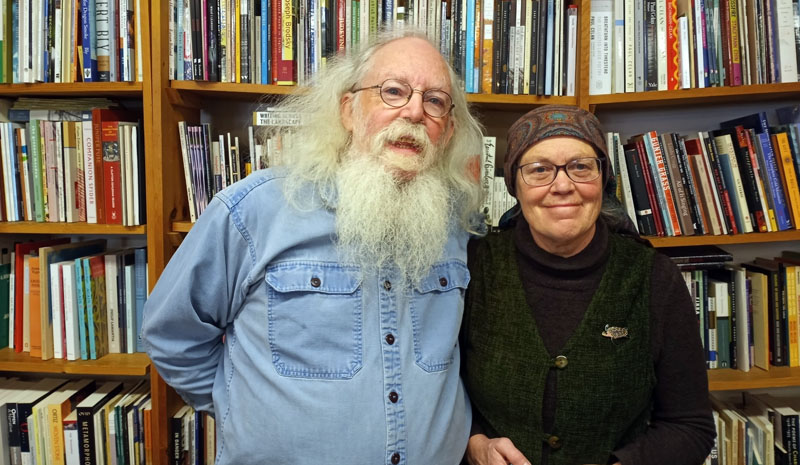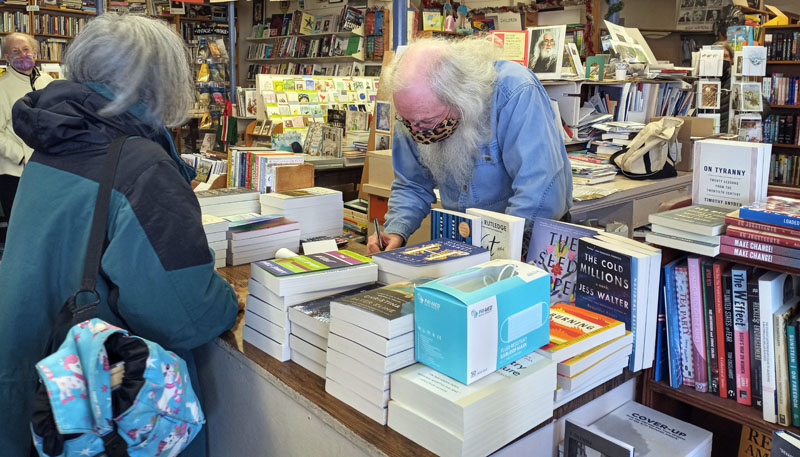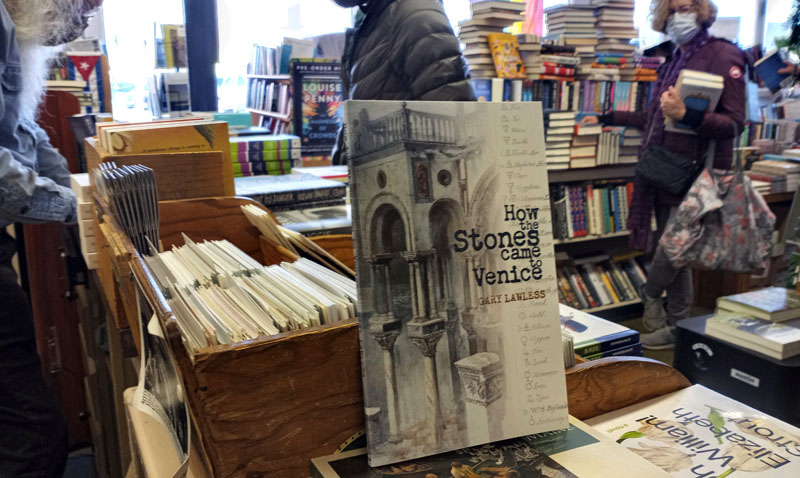
Poet Gary Lawless and photographer Beth Leonard at their bookstore Gulf of Maine Books in Brunswick. (Emily Hayes photo)
Since the 1970s, Nobleboro resident and Maine native Gary Lawless has written poetry that explores the natural world and ideas in environmentalism. One of his poems on endangered animals, and treating every creature like it is the last of its kind to exist, was translated and published in Italy by a group of environmentalists.
“They basically stole it,” Lawless joked, leaning against the counter of his book store, Gulf of Maine Books, in Brunswick.
After receiving a copy of the Italian version in the mail, Lawless said he told the environmentalists they could publish any of his works. The offer ignited a lasting connection between the Lincoln County poet and the green movement in Italy. Four of his works have been translated and published in Italian, and he traveled from Naples to Slovenia reading his works to audiences of conservationists.
Lawless and his wife, Beth Leonard, spent a month in Venice for a writing residency in 2017. His new book of poetry, “How the Stones Came to Venice,” released last week by publisher Littoral Books, delves into questions the poet had about where the stones to build the city out of a lagoon came from.
Leonard took all of the photographs included in the poetry collection.
“Out of that has come this connection with a bunch of people over there, because they were part of this environmentalist network of farmers, poets, craftspeople and musicians,” Lawless said, between handling purchases at his store.
Just after opening at 10 a.m. on a Friday, customers were already pouring into Gulf of Maine, most of them with a purpose for a particular book Lawless ordered for them. Most of them were also friends of Lawless and Leonard, who have deep roots in the poetry community of Midcoast Maine, as well.

Poet Gary Lawless helps customers at his book store Gulf of Maine Books in Brunswick. (Emily Hayes photo)
Before opening the bookstore in 1979, Lawless traveled through California much the way he did in Italy, making connections and forming friendships with people with different backgrounds from his own in Belfast.
His experience in the mountains opened his eyes to the value of travel and opening up to new ideas, though he returned less than a year later to his home state.
The couple’s home in Nobleboro, a farmhouse built in the early 1800s, was once owned by the writers Henry Beston and Elizabeth Coatsworth. Beston was a naturalist writer and leader in the American environmental movement, and Coatsworth won the Newbery Medal for a children’s book she wrote in 1931. Both of them are buried next to the house.
Their daughter, Kate Barnes, Maine’s first poet laureate, asked Lawless and Leonard to move into the house in 1986 to care for her six draft horses after her parents died. Barnes never cleaned out the house before she died in 2013, leaving the land, the house and everything in it to Lawless and Leonard.
The furniture is the same, and Lawless said he has even worn some of Beston’s clothes.
“It’s kind of spooky,” Lawless said, since he knows so much about the previous owners of the house from reading their books.
“Kate always said the farm’s major crop was words,” he said.
In honor of the writers, Lawless placed the farmhouse and land, known as Chimney Farm, under a conservation easement to ensure it is protected as a conservation and historical site indefinitely through Midcoast Conservancy, with almost 90 acres and 6,000 feet of protected shoreline.
In his poetry and the community of progressive readers that frequent Gulf of Maine Books, Lawless said he wants people to “think more closely about their connection to the natural world around them.”
His works of poetry, such as “Caribouddhism,” include human beings and community as part of the natural world.

Gary Lawless’s new work of poetry, “How the Stones Came to Venice,” is available at his book store Gulf of Maine Books or online with publisher Littoral Books. (Emily Hayes photo)
“I used to do a lot of stuff for trees and wolves, but some people pointed out to me that I was overlooking my own species,” Lawless said.
Over the past 40 years, he has lead writing projects for people with disabilities and worked with people who were homeless in Portland, helping them share their stories.
“You don’t really think of doing creative work with the homeless population or people with disabilities,” Lawless said, “but just because their legs don’t work right doesn’t mean their hearts don’t work right.”
The goal of Lawless’ work is to help people express themselves as he does through poetry, which will create a “way we can all live peacefully on the planet without hurting each other,” he said.
Beyond Italy, Lawless’ poetry has brought him to countries such as Cuba, Latvia and Lithuania. While he is grateful to share his work around the world and learn from new people, the Nobleboro and Brunswick communities are home for Lawless and Leonard.
“Nobleboro is this really beautiful place that hasn’t been messed up by humans too much, and there are humans in and around it who want it to remain a beautiful place,” Lawless said.
“I mean, there are parties in May to welcome the alewives back! These are the people I want to hang out with.”
(Do you have a suggestion for a “Characters of the County” subject? Email info@lcnme.com with the subject line “Characters of the County.”)






